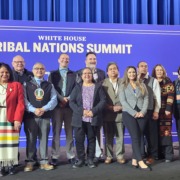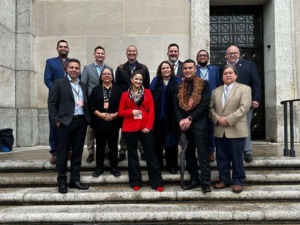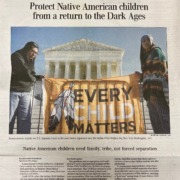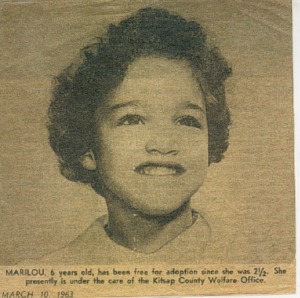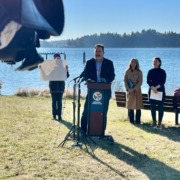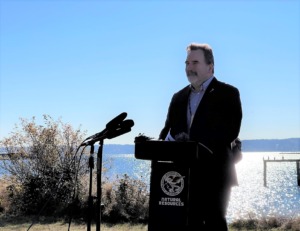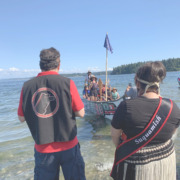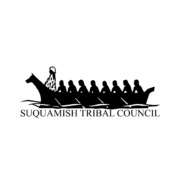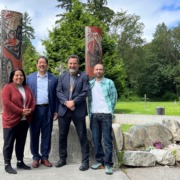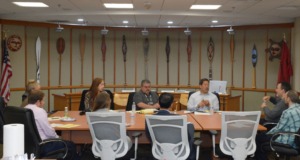Most help goes to Kitsap County organizations
Lawrence Devlin, a veteran with KC Help, refurbishes electric wheelchairs, hospital beds, and other medical equipment in his garage and donates them to local residents in need. Elsewhere in Kitsap County, a small group of moms works to make sure new mothers get support during the critical first months of their babies’ lives. When teachers need extra help to enrich their students’ learning, the North Kitsap Schools Foundation is there to help with small grants.
These are just three among dozens of local groups who have received support from the Suquamish Tribe. Much of this giving happens via the Tribe’s charitable nonprofit, the Suquamish Foundation. In the third quarter of 2022 alone, the Suquamish Foundation donated $150,437 to charitable organizations, schools, Native American groups, event sponsorships, and civic organizations, mostly in Kitsap County. The Suquamish Foundation’s total giving for the year was $530,876.
The Tribe’s business ventures, which operate under the Port Madison Enterprises (PME) umbrella, also contribute generously. PME donated an additional $222,164 to local groups, in 2022.
Suquamish Tribal government donated another $210,000 to area first responders.
Total funding from the Tribe’s foundation, enterprises, and government totaled more than $960,000 in 2022.
The Suquamish Foundation: The Tribe’s nonprofit arm
The Suquamish Tribe’s Foundation is a tribally chartered non-profit that contributes each quarter to groups that support the quality of life, environment, and culture of the central Puget Sound region.
Some of the Foundation’s largest ongoing gifts go to Kitsap Strong.
“The Tribe offers essential core funding we rely on to do the long-term innovative work of forming healthy relationships within ourselves and with others,” says Cristina Roark, Kitsap Strong Director, Community Innovation. “With the Suquamish Tribe’s ongoing support, Kitsap Strong is able to help all people in the Kitsap community heal from intergenerational trauma and toxic stress. This work — based on the latest research around protective factors and the Indigenous wisdom of our ancestors — helps build individual hope and community resilience.”
The Tribe also contributes matching funds to Kitsap Great Give, as it has since the first year of the group’s countywide funding campaign.
These matching grants are designed to support community contributions that strengthen Kitsap County by encouraging a spirit of reciprocity, says Suquamish Foundation Director Robin L.W. Sigo.
“The Tribe encourages people to give local,” Sigo said. “We want to see funding go where area residents want the support to go.”
Addressing pandemic impacts on area nonprofits
Requests for support received by the Suquamish Foundation this year reveal some of the lasting impacts of the pandemic, according to Sigo. Many area nonprofits, civic groups, and schools were unable to hold the fundraising events they relied on for support prior to COVID, so some were scrambling to make up for the lost revenue.
Meanwhile, low-wage workers, and those struggling with high housing, food, and energy bills were hit hard by the pandemic. And many already vulnerable before COVID faced even greater challenges with mental health and substance abuse.
“The Suquamish Tribe worked hard to do our part to help fill the gaps,” Sigo said. “Many of the groups we fund are small, but they make a big difference to the people they support.”
Suquamish Tribe giving extended beyond Kitsap County, including areas that are part of the Tribe’s traditional territory in Seattle and beyond. For example, one donation went to the SeaTac USO, which offers military service members and their families a place for rest and refreshment when traveling.
The Foundation also help fund the Seattle Aquarium’s planned new Ocean Pavilion.
“Their vision aligns with ours in terms of protecting the Salish Sea and the ocean as a whole,” said Sigo. The pavilion is designed to offer an experience of ocean life to visitors while supporting efforts to conserve the marine environment.
The Foundation also contributed to Western Washington University’s planned longhouse, which will offer a space for indigenous students and others to learn about the state’s tribal nations and diverse cultures.
“Western Washington University is located on Indian traditional land, but there was no place for indigenous students to gather,” Sigo noted. Like the wǝɫǝbʔaltxʷ (the Intellectual House) on the University of Washington campus, the Western Washington longhouse will reflect Coast Salish design, and will support Native students by providing gatherings spaces and promoting cultural understanding.
PME helps enhance community quality of life
In addition to the Suquamish Foundation, the Tribe’s business arm is also a regular contributor to local organizations and charities.
In 2022, the Port Madison Enterprises supported Visit Kitsap, the Mike Tice Foundation, the Rise Up Academy, the Silverdale Rotary, Kitsap Great Give, the Kitsap County Fair, and Kids in Concert, among others. In all, PME gifts and sponsorships totaled $222,164 so far this year.
“As one of the largest employers in Kitsap County, our contributions are aimed at enhancing the quality of life in this community for our employees, customers, and future generations who will come after us,” said Rion Ramierez, CEO of Port Madison Enterprises.
PME includes the Clearwater Casino Resort, the White Horse Golf Club, Kiana Lodge, PME Retail (including gas stations), PME Construction, and the Suquamish Evergreen Corporation, which includes Agate Dreams and Tokem Cannabis. The PME board is appointed by the Suquamish Tribal Council.
Funding Regional First Responders
Separately, the Suquamish Tribe also made $210,000 in direct payments to area first responders in 2022. The Bainbridge and Poulsbo police and fire departments received funding along with the Kitsap County sheriff, North Kitsap Fire and Rescue, the Washington State Patrol, and the Suquamish Police. A multi-jurisdictional training program for police and fire districts also received support. The payments take place in alternate years as part of the Tribe’s gaming compact with the state of Washington.






